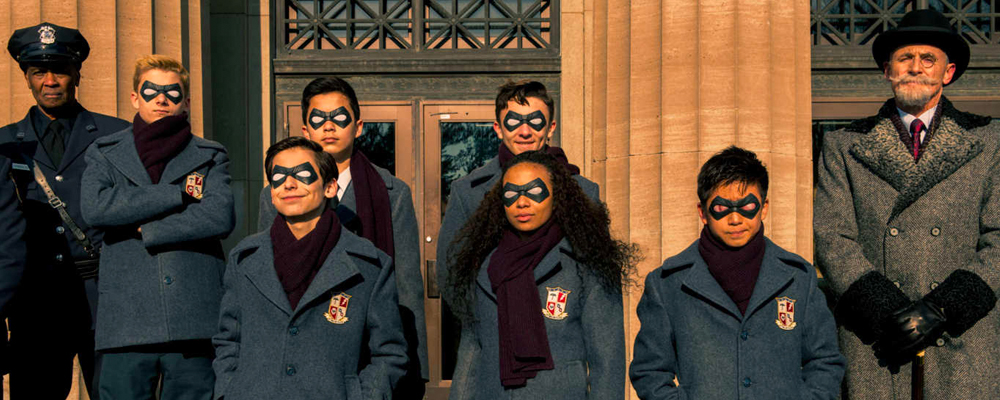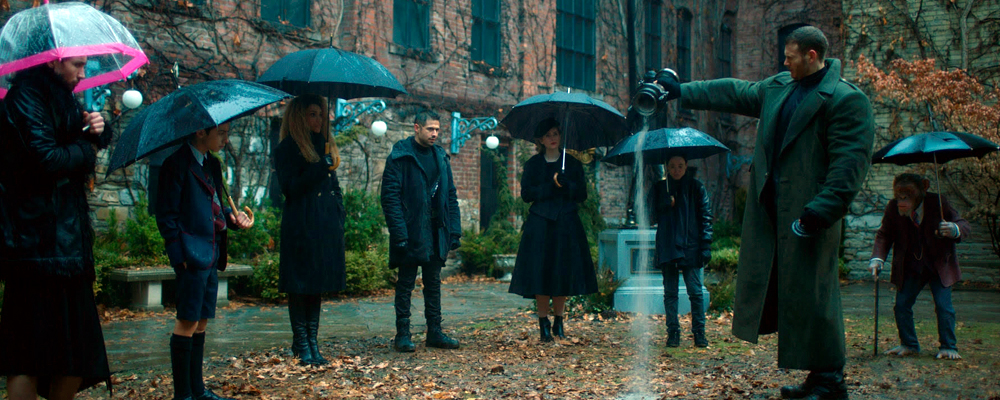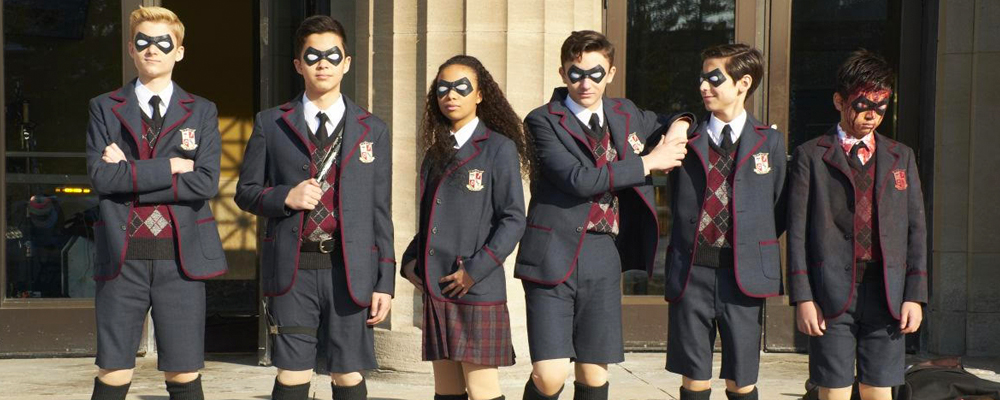Superhero Siblings Decode Their Pasts in Netflix’s ‘The Umbrella Academy’
Alci Rengifo
Dressed in gloom and doom, Netflix’s “The Umbrella Academy” pretends that even superheroes have family issues. Based on the award-winning comics by Gerard Way (My Chemical Romance) and Gabriel Ba, this series is a strange clash of styles. It wants to be a lively superpowers fest, decked with pop and rock songs, yet it also wants to pose as some kind of dreary, serious drama. The result is a rather lumbering show, stylishly shot and occasionally entertaining.
The story tells of a group of people born around the world at the same time. A well-done opening scene shows a women suddenly giving birth by a pool in the Soviet Union. Born with special abilities, the children are scooped up by a billionaire named Sir Reginald Hargreeves (Colm Feore). In semi-X-Men style, the step-siblings are raised in Hargreeves’s estate. Fast forward to the present and we now meet them as adults. They are Klaus (Robert Sheehan), a telekinetic with a serious alcohol problem, Luther (Tom Hopper), an astronaut with a gargantuan frame, Diego (David Castañeda), an expert knife-thrower, Allison (Emmy Raver-Lampman), a movie star who can manipulate perceptions with lying, and the very young Number Five (Aidan Gallagher), who can travel through time and space. There is also Vanya (Ellen Page), who is a good violinist but is the only sibling without powers. They all come together when Hargreeves suddenly passes away. While they all fall into gloomy self-reflection, at times bringing out old resentments, Number Five is undergoing a crisis of his own. He is being plagued by visions of a coming apocalypse which will destroy everything. What causes this cataclysm, which is a mere eight days away, obsesses Number Five and he confides in Vanya who decides to try and help him. Meanwhile Luther suspects their father might have died an unnatural death, and begins his own quest to find the truth. But a team of assassins, Cha-Cha (Mary J. Blige) and Hazel (Cameron Britton), are on the prowl for the heroes as well.
Maybe only the truly diehard comic book (or comic book-based media) aficionados can muster the patience required to sit through all of “The Umbrella Academy’s” first season. Much of the show’s aesthetic and attempted tone is obviously borrowed from Zack Snyder’s take on Alan Moore’s “Watchmen.” There is the same draining of the color palette, the same attempt at slow burner shots and picturesque framing. Above all there is the sense that this material should be taken as seriously as Alfonso Cuaron’s “Roma.” But while the Snyder film was full of political commentary and social satire through a comics lens, “The Umbrella Academy” feels like lighter material being forced into being gloomy. There’s a strange disconnect in the depressive pace and the sudden appearance of Queen or INXS on the soundtrack. Number 5 carries out a virtual massacre at a diner to the tune of “Istanbul (Not Constantinople)” that feels like a bad imitation of bad films like “Suicide Squad.” In another scene he will dig through apocalyptic ruins and hold a severed eyeball while a cover of “Never Tear Us Apart” plays. It’s a case of either trying too hard or not hard enough.
But in-between these moments, especially for the first four episodes, the show feels like a drawn out wake. The plot barely advances and endless scenes are dedicated to how each individual sibling mope around, feel sorry for themselves and deal with first world problems. Vanya feels left out because she’s just a decent violinist, not a cool crime fighter, Klaus inspires little sympathy because he is the agent of his own destruction, he’s like that self-destructive friend you just get tired of trying to help. Luther is the mature one in the group, to the point of being quite a boring character. With his giant arms and huge chest, he just stands around, getting angry at the immaturity of someone like Diego. Their dilemmas and questions drag on for so long that by the time a videotape hints at bigger questions about their father’s death, it’s hard to keep caring. We almost welcome the scenes where Cha-Cha and Hazel, wearing animal masks, burst in with their weapons, blowing everything in sight to bits. At least in these scenes the show gets moving. Number Five’s storyline involving his apocalyptic visions is told in spurts and hints that also generate little engagement because we’ve already seen the world blow up in nearly every superhero romp. Mary J. Blige is enjoyable as a deadly assassin. She has more style than the rest of the superhero family combined. Jordan Claire Robbins is also alluringly strange as Grace, the robot companion Hargreeves programmed to raise his adopted kids.
“The Umbrella Academy” is the kind of show that inspires vicious defensiveness from comic book cultists, who will defend to the death the source material. But a show, like a film, is an art form dependent on keeping the viewer immersed or interested. Unless you are so devoted to this material that any adaptation will suffice, it might be a challenge to feel like binging this.
“The Umbrella Academy” season one premieres Feb. 15 on Netflix.



